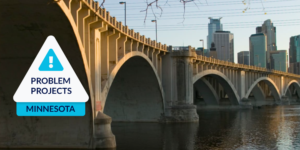
A $60 million rehab of Minneapolis’ 10th Avenue Bridge, a 91-year-old structure spanning the Mississippi River, is reportedly close to completion — but disputes over schedule delays and missed payments will likely drag on for months.
While the project included major structural repairs to the bridge itself, scheduling and payment disputes arose on the tunnel portion of the infrastructure project. The 71-year-old water main that was suspended from the bottom of the bridge was scheduled to be replaced with a new 950-foot-long water main running 35 feet beneath the Mississippi River.
On October 7, 2021, subcontractor Keller Industrial, Inc. filed a bond claim for $588,000, alleging that the general contractor failed to make payments for the ground-freezing work they performed to retrieve micro-tunneling equipment that was left in the shaft.
Keller also sued ECI for breach of contract and filed a lien over non-payment of $588,092.00. According to court filings, Keller alleges ECI violated the Minnesota Prompt Payment Act by failing to pay Keller within 10 days of receiving the funds from the project owner.
ECI Engineering and Construction, the Minnesota-based civil construction firm hired to oversee the $15.6 million water main contract, hired Keller Industrial after terminating Bradshaw Construction Corporation, the original subcontractor hired to fulfill a $2.6 million tunneling contract. That relationship ended poorly, with both sides accusing the other of mismanaging the project.
The tunneling job ultimately proved to be difficult, with numerous geological challenges and organizational issues causing delays. Several times, ECI was forced to halt all work due to leaks and flooding in the tunnel shafts.
In a lawsuit filed in March 2020, ECI sued Bradshaw for breach of contract, blaming the flooding and subsequent delays on sub-par concrete work, which allegedly failed to keep water out of the shaft.
In Minnesota state court filings, ECI alleged that after the flooding, Bradshaw failed to come up with a solution and caused further unnecessary delays and costs. ECI fired Bradshaw and sought compensation for the costs incurred from the repairs.
ECI was also forced to halt progress when a boring machine became stuck in the tunnel. ECI enlisted Keller Industrial Inc. and their ground freezing services to free the equipment.
Initially successful, Keller alleged in court documents that ECI later took several actions “detrimental to the frozen mass,” including leaving a heater in the shaft and using a high-temperature air arc to cut a pipe in the shaft. This allegedly caused the work Keller had provided to fail, allowing water to flood the tunnel.
Keller claimed this work was done without their knowledge and against their designs.
Bradshaw countersued ECI in March of 2020 for breach of contract and wrongful termination, rejecting the notion that their concrete work was the cause of flooding and delays.
Bradshaw claimed that ECI’s own work was at fault, and that the Geotechnical Baseline Report provided by Black & Veatch, describing the subsurface conditions that Bradshaw had designed its plans around, turned out to be inaccurate.
Bradshaw claimed in Minnesota state court documents that it encountered “unique and unusual soil conditions” that were not “indicated or referred to in any manner” in the geological report.
As a result, Bradshaw claimed to have been seriously inhibited by geological conditions it had not prepared for.
ECI had also allegedly refused to allow Bradshaw to retrieve its expensive tunneling equipment after the termination.
In September 2020, Bradshaw’s lawsuit alleging breach of contract, prompt payment violations, and other claims, was dismissed with prejudice by the US District Court of Minnesota, without costs or disbursements awarded to either party. Both the original lawsuit ECI brought against Bradshaw, and Bradshaw’s subsequent counterclaim against ECI, are ongoing.
In 2019, the City of Minneapolis began planning repairs on the 10th Street Bridge and water main with an estimated completion date of July 2021. Last refurbished in the 1970s, joint leaks and salt corrosion over the years led to concrete degradation in several key areas of the bridge.
Schedule Delay: How to Assess & Reduce Impact in Construction
With blame directed at all sides, various issues have ultimately forced the bridge project to miss its completion deadline by almost four months now.
The project now lists Fall 2021 as the final completion date, and a recent newsletter update suggests the majority of bridge repair work is now complete.